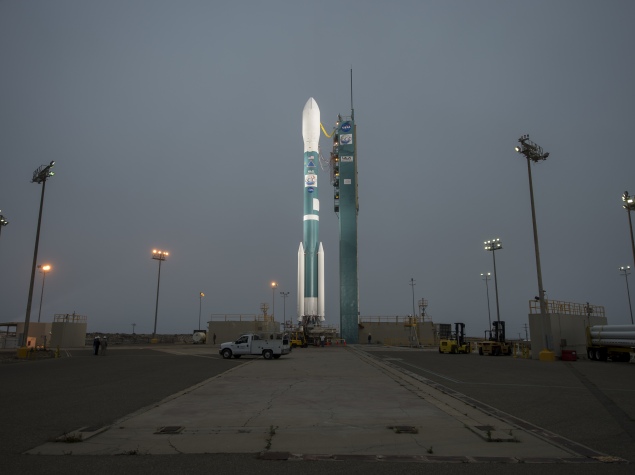- Home
- Science
- Science News
- Nasa Successfully Launches Orbiting Carbon Observatory on Wednesday
Nasa Successfully Launches Orbiting Carbon Observatory on Wednesday

A rocket carrying a Nasa satellite designed to track global warming has launched from California five years after the original crashed.
The Delta 2 rocket blasted off into the pre-dawn skies Wednesday over Vandenberg Air Force Base. It is carrying a satellite dedicated to studying carbon dioxide, the chief culprit behind climate change.
The original launch was cancelled on Tuesday morning less than a minute before lift-off as the pad's water system failed. The pad's water system is needed in case of a fire and to help suppress potentially damaging acoustic vibrations from launch.
(Also Read: Nasa to Attempt Launch of Carbon Dioxide Tracking Satellite on Wednesday)
The rocket carries Nasa's $465 million Orbiting Carbon Observatory. Built by Orbital Sciences Corp, it is designed to measure where carbon dioxide, a greenhouse gas tied to climate change, is moving into and out of the atmosphere.
"Now that humans are acknowledging the environmental effects of our dependence on fossil fuels and other carbon dioxide-emitting activities, our goal is to analyze the sources and sinks of this carbon dioxide and to find better ways to manage it," said Gregg Marland, a professor in the Geology Department of Appalachian State University, Boone, North Carolina.
The satellite will take 24 measurements every second, about a million per day, but clouds are a major obstacle. Its field of view is about one square mile (three square kilometers), so even wispy clouds can obscure its measurements. Nasa expects about 100,000 of the satellite's data snapshots from around the world daily will be sufficiently cloud-free to be useful.
(Also Read: Nasa Launching Satellite Tuesday to Track Carbon Pollution)
The United Launch Alliance had just 30 seconds to get the rocket off the launch pad to properly position the OCO satellite at the front of a train of polar-orbiting spacecraft that passes over Earth's equator at the same time every afternoon.
In 2009, the space agency launched a replica satellite aboard a smaller and cheaper Taurus XL rocket. Minutes after liftoff, the rocket crashed into the ocean off Antarctica.
Investigators later determined a piece of rocket hardware protecting the satellite did not separate as planned, preventing the satellite from reaching orbit.
Written with agency inputs
For the latest tech news and reviews, follow Gadgets 360 on X, Facebook, WhatsApp, Threads and Google News. For the latest videos on gadgets and tech, subscribe to our YouTube channel. If you want to know everything about top influencers, follow our in-house Who'sThat360 on Instagram and YouTube.
Related Stories
- Galaxy S24 Series
- MWC 2024
- Apple Vision Pro
- Oneplus 12
- iPhone 14
- Apple iPhone 15
- OnePlus Nord CE 3 Lite 5G
- iPhone 13
- Xiaomi 14 Pro
- Oppo Find N3
- Tecno Spark Go (2023)
- Realme V30
- Best Phones Under 25000
- Samsung Galaxy S24 Series
- Cryptocurrency
- iQoo 12
- Samsung Galaxy S24 Ultra
- Giottus
- Samsung Galaxy Z Flip 5
- Apple 'Scary Fast'
- Housefull 5
- GoPro Hero 12 Black Review
- Invincible Season 2
- JioGlass
- HD Ready TV
- Laptop Under 50000
- Smartwatch Under 10000
- Latest Mobile Phones
- Compare Phones
- Huawei Pura 70 Pro
- Huawei Pura 70
- Vivo V30e
- Itel Super Guru 4G
- Huawei Pura 70 Pro+
- Huawei Pura 70 Ultra
- Tecno Camon 30 Premier 5G
- Motorola Edge 50 Fusion
- Asus ZenBook Duo 2024 (UX8406)
- Dell Inspiron 14 Plus
- Realme Pad 2 Wi-Fi
- Redmi Pad Pro
- Cult Shock X
- Fire-Boltt Oracle
- Samsung Samsung Neo QLED 8K Smart TV QN800D
- Samsung Neo QLED 4K Smart TV (QN90D)
- Sony PlayStation 5 Slim Digital Edition
- Sony PlayStation 5 Slim
- Voltas 1.5 Ton 3 Star Split AC (183 Vectra Elegant 4503545)
- Hitachi 1.5 Ton 5 Star Inverter Split AC (RAS.G518PCBISF)

















